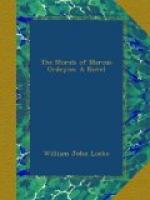“Then you’re a baronet,” she said, severely.
“I assure you it is not my fault.”
“I thought all baronets were wicked. They are in the novels. Somehow you don’t look like a baronet. You ought to have a black moustache and an eyeglass and smoke a cigar and sneer. But, say, how do you fill up the time if you do nothing to make money?”
“I am going through the world,” said I, “on an adventurous quest, like a knight—or a baronet, if you will—of the Round Table. I am in quest of a Theory of Life.”
“I guess I was born with it,” cried young New York.
“I guess I’ll die without finding it,” said I.
London again. My quiet house. Antoinette and Stenson. The well-ordered routine of comfort. My books. The dog’s-eared manuscript of the “History of Renaissance Morals,” unpacked by Stenson and hid in its usual place on the writing-table. Nothing changed, yet everything utterly different.
A growing distaste for the forced acquaintanceships of travel and a craving for home brought me back. Save perhaps in health I had profited little by my journeyings. My bodily shell formed part of strange landscapes and occurred in fortuitous gatherings of men, but my heart was all the time in my Mausoleum by the Regent’s Park. I was drawn thither by a force almost magnetic, irresistible. My two domestics welcomed me home, but no one else. Only my lawyers knew of my arrival. With them alone had I corresponded during the many months of my absence. Stay; I did write one letter to Mrs. McMurray while I was at Verona, in reply to an enquiry as to what had become of Carlotta and myself. I answered courteously but briefly that Carlotta had run away with Pasquale and that I should be abroad for an indefinite period. But not even a letter from my lawyers awaited me. I thought somewhat wistfully that I would willingly have paid six and eight pence for it. But the feeling was momentary.
Then began a queer, untroubled life. Without definite resolve I became a recluse, living forlornly from day to day. Like a bat I avoided the outer sunshine and took my melancholy walks at night. I had a pride in cherishing the habit of solitude. Were it not that I entertained a real dislike of roots and water and the damp and manifold discomforts of a cave, with which form of habitat the ministrations of Stenson and Antoinette would have been inconsistent, I should have gone forth into the nearest approach to a Thebaid I could discover. I was, in fact, touched by the mild mania of the hermit. My club I never entered. A line drawn from east to west, a tangent at the lowest point of the Zoological Gardens formed the southern boundary of my wanderings. Once I spied in the distance that very kind soul, Mrs. McMurray, and rushed into a providential omnibus, so as to avoid recognition. My History remained untouched. The glamour of theRenaissance had vanished. For occupation I read the Neo-Platonists, Thaumaturgy, Demonology and the like, which I had always found a fascinating although futile study. I regretted my bowing acquaintance with modern science, which forbade my setting up a laboratory with alembics and magic crystals wherewith to conduct experiments for the finding of the Elixir Vitae and the Philosopher’s Stone.




